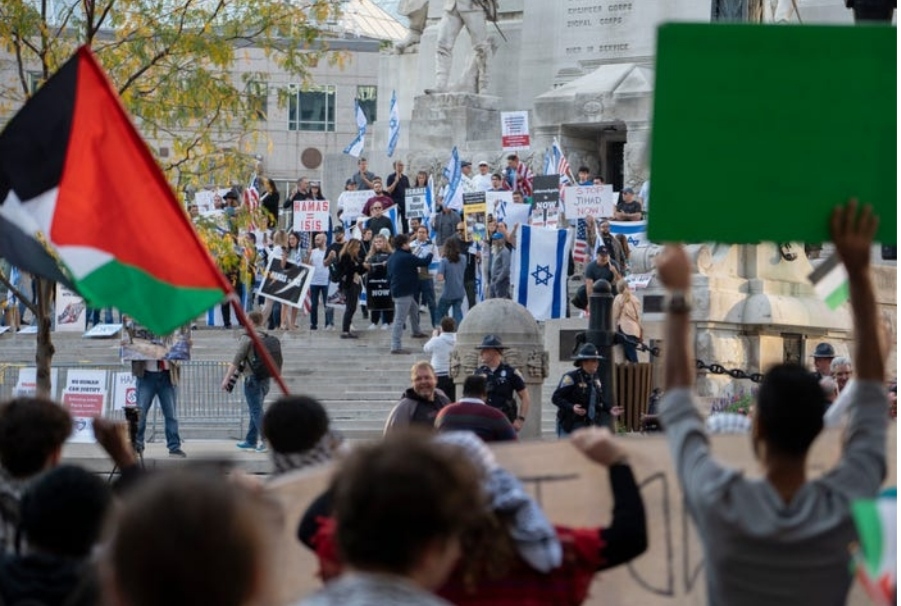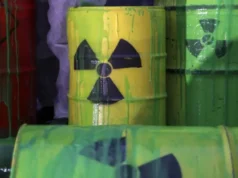A gulf of perspectives is growing among US millennials amid war in Israel
By
Chris Kenning

On one side of a brick street at the centre of this Midwest city’s downtown Thursday evening, Benjamin Gross held a sign reading “Palestine Will Be Free,” chanting along with more than 150 demonstrators waving red, black and green flags.
The 24-year-old researcher, who grew up with a Jewish father, said he was not out to justify Hamas’ brutal attack on Israel – but to highlight suffering he views as rooted in decades of unjust Israeli policies toward Palestinians.
Just across the street lined with police, 30-year-old Max Profeta perched on the steps of a towering war memorial in a yarmulke. His sign read “Stop Jihad Now!” Dozens of others waved Israeli flags or held posters or photos of people kidnapped or possibly killed by Hamas.
The real estate professional, who has friends in Israel forced to spend terrifying hours in safe rooms or who were called into military service, rejected any efforts to blame Israeli policies for an attack in which Palestinian militants targeted civilians, slaughtered music festival attendees and kidnapped families. And he argued that Israel has worked to help the Palestinian people.
Though the street separating them was narrow, the gulf in their perspectives couldn’t have been wider.
Error! Filename not specified.
Last weekend’s surprise attack has highlighted divides that are the sharpest among such U.S. millennials, those born between 1980 and 2000, whose sympathy toward Palestinians has grown in recent years.
A Gallup poll released in March found that, unlike older generations who remain more sympathetic to Israel, millennials are almost evenly split on whether they align more with Israelis or Palestinians. Limited data suggested that members of the younger Generation Z hold similar views.
The situation can be particularly complex for some young American Jews, who came of age or raised families in an era of social media, renewed protests over racial and social justice and concern about democracy in the U.S. and in Israel, where some maintain close ties.
Tensions over the conflict rippled across America this week, including in Indianapolis’ roughly 18,000-member Jewish community. For some, the attack caused them to gut-check their own beliefs.
Maya Simon, a 27-year-old teacher who is part of an Indianapolis Jewish young professionals group, said she has long been critical of Israeli policies in regard to Palestinians.
Simon said in recent days she’s been unsettled by difficult conversations, unsure how to respond to progressive friends who say, “Well, you know, it’s to be expected.”
Since the attacks, she’s become far more supportive of Israel, she said – even as she worries the attack will set back the cause of Palestinian rights.
“Internally, I’m struggling a lot,” she said.
Why Palestinian sympathies have grown among millennials
Some left-leaning young adults in Indianapolis’ Jewish community can point to a key moment that crystallized a shift in sympathies toward the Palestinians.
For Gross, it came after enrolling at Butler University in 2016, where pro-Palestinian groups such as Students for Justice in Palestine and Jewish Voice for Peace offered a perspective he hadn’t often heard growing up.
Error! Filename not specified.
“My dad’s side of the family is Jewish. As a kid, I celebrated Hanukkah with my grandparents and we lit the menorah,” he said. “But I didn’t pay much attention to the state of the Israeli-Palestinian conflict prior to college.”
He began to see Israeli policies as lopsided, unfair and oppressive for Palestinians – including those in Gaza, the strip of land blockaded by Israel since Hamas took power in 2007 – and a key driver in the decadeslong conflict.
For Rachel Leininger, 32, an Indianapolis mother who also attended the demonstration Thursday, it was the research she did while considering a birthright trip to Israel during college, digging into concerns she hadn’t learned in Hebrew school or from older generations.
”I got very turned off,” said Leininger, who went on to advocate for Palestinian rights.
Error! Filename not specified.
Eva Borgwardt, political director of IfNotNow, a Jewish American youth-led movement that aims to “end U.S. support for Israel’s apartheid system” and advocates for “equality, justice, and a thriving future for all Palestinians and Israelis,” said she saw parallels with the recent U.S. protests sparked by police shootings.
Another factor influencing public opinion may be opposition to Israel President Benjamin Netanyahu’s push to overhaul the country’s judiciary, which drew massive protests from critics who maintained it would undermine Israel’s democratic institutions.
A recent Pew study found younger Jews were more likely to give Netanyahu a poor rating than their parents and grandparents and less likely to believe Israel’s government had made a sincere effort toward peace with the Palestinians.
Despite the rising death toll among Palestinians amid Israel’s counter-offensive against Hamas in Gaza, Gross thinks the nature of the Hamas attack is likely to shift some younger people’s attitudes toward Israel.
It felt strange, he said, to be demonstrating across from people in the Jewish community. But he also thinks it’s possible to oppose injustices against Palestinian people while rejecting the militants’ violence.
“I do feel conflicted,” he said. “I think about the lives lost on either side. And especially with the taking of hostages and the reports of potential executions and that kind of thing. I mean, I think that’s horrible.”
Still, he added: “It’s important to draw attention to the root causes” of the larger struggles for Palestinians.
Hamas attacks amplify solidarity with Israel
Eli Isaacs, a 36-year-old Indianapolis attorney, was having a slow morning at home last Saturday with his wife and three young children when his phone started pinging.
Alerts and texts piled up. The enormity and horrifying violence of the attacks – the deadliest by Hamas in Israel’s history – slowly sunk in as he watched cable news and more reporting emerged.
He would learn that Hamas had invaded by land, sea and air, catching the military off guard. Militants went on a killing spree, including shooting more than 200 people at a music festival. They terrorized small towns and took hostages, including women and children. Overall, more than 1,200 Israelis have died as a result of attacks.
Isaacs checked on friends. Online, he also saw pro-Palestinian demonstrations breaking out in various U.S. cities. Despite the complexities of a decades-old conflict, he said, “I don’t have any tolerance for any kind of rationalization of what we’ve seen.”
He wondered how the attacks might impact attitudes, and conversations, going forward.
“I’ve always said that we can talk about anything as long as we can start on a mutual common ground, that Israel has a right to exist and an obligation to defend its citizens,” he said. “I think you’re starting to see a shift away from a kind of universal acceptance of those two things, unfortunately, among some communities.”
In recent days, such divides led to ongoing fallout at Harvard University, where alumni and others criticized student groups that issued a statement attributing the violence to Israel’s treatment of Palestinians. At New York University, a student was accused of “cheerleading” after posting about her solidarity with Palestinians on social media. A law firm rescinded its offer of a job following the incident, the New York Times reported.
Error! Filename not specified.
Those views were less visible to Isaacs when he was growing up in a Jewish family in Indianapolis, attending synagogue and celebrating his bar mitzvah. Reverence for the State of Israel was a constant, he said.
During his college years at Indiana University, he said he wasn’t aware of his generation’s diverging viewpoints on the issue. He travelled twice to Israel, trips that deepened his understanding of Israeli-Palestinian issues.
After becoming a lawyer and moving back to Indianapolis in 2014, Isaacs said he volunteered with the local Jewish Community Relations Council in part because he saw anti-Semitism rising. After the attacks last week, he said he noticed the public response didn’t seem as widespread as when Ukraine was invaded or other countries faced terror attacks.
“At times, it feels very lonely to be Jewish,” he said.
Jewish community comes together in solidarity with Israel
On Monday, Isaacs helped organize a solidarity gathering at Congregation Beth-El Zedeck, a synagogue tucked into an Indianapolis neighborhood of sprawling lawns, for community members. Cars soon jammed the residential streets leading to the synagogue.
Police were on hand for security, and attendees had to pass by guards with metal detectors before entering. Hundreds turned out, holding the blue and white flags of Israel. Grief and anger filled the large synagogue, its sea of seats stretching outward toward wood-paneled walls.
Error! Filename not specified.
“The last three days have brought sadness, horror, shock, anger, frustration and so many other emotions that are difficult to articulate,” said Rabbi Hal Schevitz.
The mayor of a town near the Gaza border, who had recently visited Indianapolis, had been killed, said Marc Swatez, head of the Jewish Federation of Greater Indianapolis. Others were worried about relatives and friends.
“It feels very real; there’s not too many degrees of separation,” Isaacs said.
Isaacs said the conflict only reinforced his desire to aid the local Jewish community and continue to support Israel. He is still trying to figure out how to talk about the attacks with his 6-year-old child. But, like others, he remains hopeful.
The 2020 Pew study tapped into that optimism among Jews, with more than two-thirds of respondents saying they believed Israel and Palestine could find a way to coexist peacefully. Those Isaacs’ age and younger were the most positive.
“I’m always hopeful,” he said, “that people will see through it to the humanity on both sides.”
Source : USA TODAY



